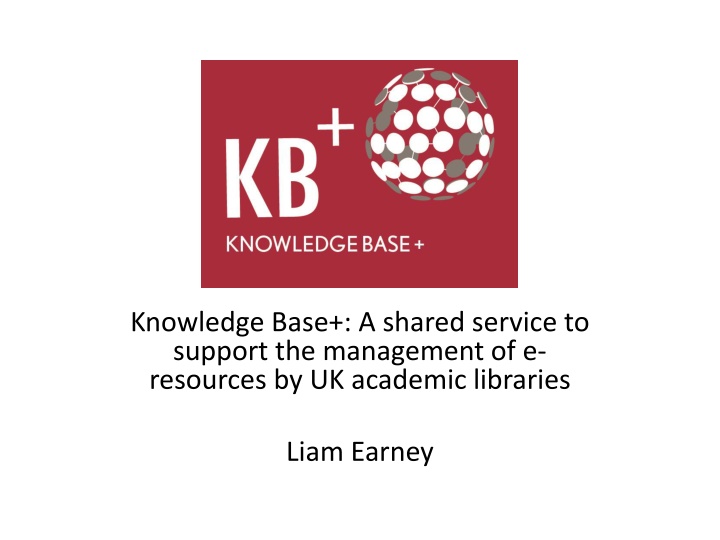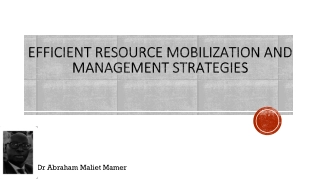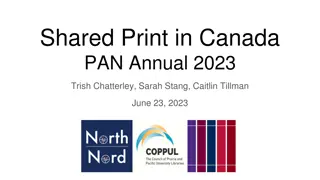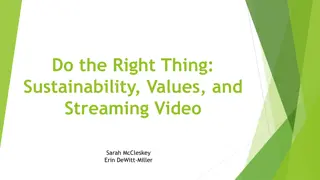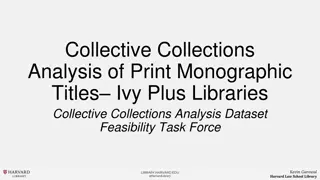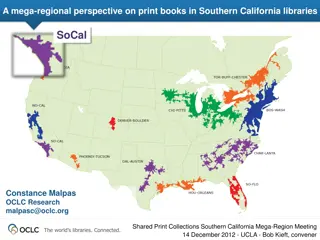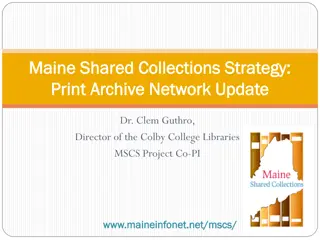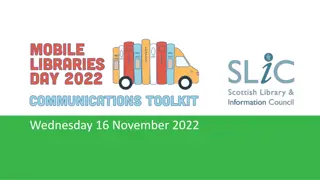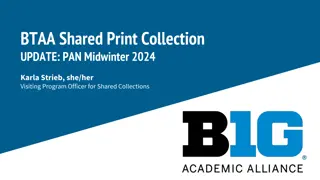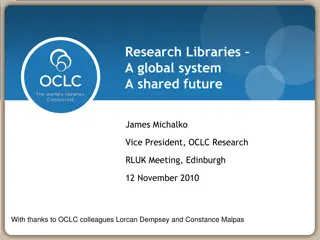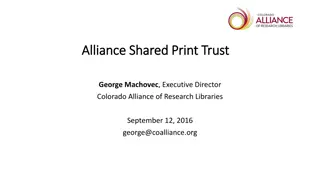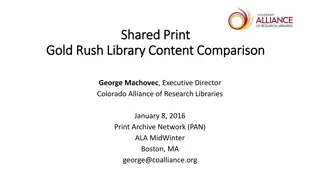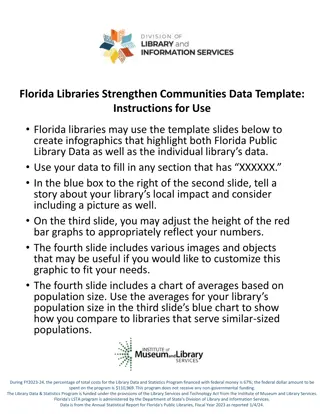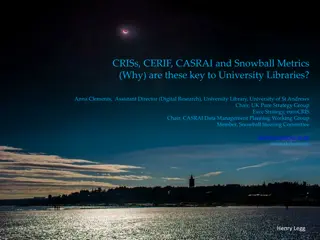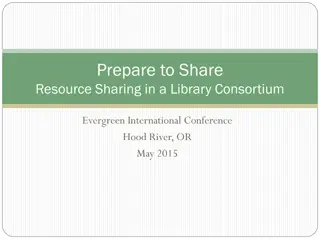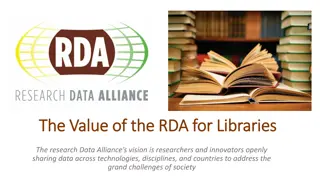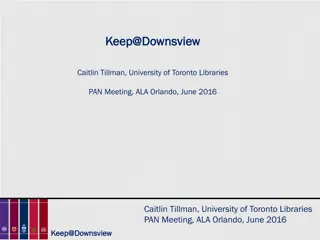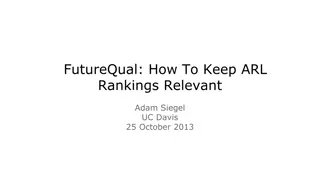Shared Service for E-Resource Management by UK Academic Libraries
This knowledge base discusses the journey of establishing a shared service to support the management of e-resources by UK academic libraries. It covers the vision, objectives, challenges faced, milestones achieved, and the importance of accurate and structured ERM information. The aim is to minimize duplication of effort, improve data sharing between library systems, and enhance the return on investment in managing electronic resources. The story outlines the collaborative efforts of various institutions and organizations in creating a valuable resource for the academic community.
Download Presentation

Please find below an Image/Link to download the presentation.
The content on the website is provided AS IS for your information and personal use only. It may not be sold, licensed, or shared on other websites without obtaining consent from the author.If you encounter any issues during the download, it is possible that the publisher has removed the file from their server.
You are allowed to download the files provided on this website for personal or commercial use, subject to the condition that they are used lawfully. All files are the property of their respective owners.
The content on the website is provided AS IS for your information and personal use only. It may not be sold, licensed, or shared on other websites without obtaining consent from the author.
E N D
Presentation Transcript
Knowledge Base+: A shared service to support the management of e- resources by UK academic libraries Liam Earney
The story so far Issues with ERM Vision and Objectives Approach Deliverables of Phase 1 KB+ at Day 1 and the first year Sustainability Conclusions
The story so far 2009 December - SCONUL Shared Services study prioritises electronic resource licensing and management in its report to HEFCE 2010 December - Sixteen universities collaborate with JISC and SCONUL in developing detailed business requirements, published May 2011 2011 February - HEFCE agree to invest UMF funds to Summer 2012 towards the creation of a shared UK academic knowledge base service 2011 July - JISC Collections appointed by HEFCE and JISC to take this forward with the community, drawing on SCONUL s work and its own knowledge and experience 2011 October An independent Project Board is established chaired by Richard Parsons of the University of Dundee with subgroups covering Technical and Community aspects 2012 August KB+ made available as a beta service to UK HE
ISSUES WITH ELECTRONIC RESOURCE MANAGEMENT
Data Accuracy and availability Contextualisation Interoperability Data silos and flows Implementation of standards Workflows the workflow support problem (NISO, 2012) Duplication of effort Maintaining numerous KBs WITHIN an institution Maintaining numerous KBs ACROSS institutions
Vision To transform the practice of e- resource management through the creation of a shared service providing institutions and the services they use with timely, accurate, verified and structured ERM information.
Objectives Provide an accurate and relevant knowledge base Support data sharing between library systems Minimise the duplication of staff effort Improve return on investment from systems Increase productivity through shared activity
Leverage investment Improve quality of data for all Openness Technology Data Relationships UK, international, suppliers Standards and Best Practice Structured and accurate data Promote interoperability and exchange of data Prioritise existing issues Save time and money from the outset Cohesive activity, tools and services JISC services Commercial and non-commercial suppliers Academic institutions
Phase One Deliverables Principles Participants Academic Institutions Data JISC Services Title lists Standards Workflow Holdings Publishers Interoperability Quality KB+ Verification Systems Vendors Shared Activity Licences Alerts Usage statistics Subscription Agents Business Model Registration Agencies Legal Model
What data will be there? Functionality JISC Collections End User Title, package, platform and coverage for the current NESLi2, SHEDL, WHEEL and JISC eCollections agreements - in excess of 12,000 titles Wherever possible institutional entitlements to the above Licence information covering key values such as authorised user, remote access, ILL, use in course packs, post-cancellation access Subscriptions not offered by JISC Collections
What services will be available? Functionality JISC Collections End Users Additions and changes will be made centrally by JISC Collections in the initial phase, based on information sourced from the community Monthly usage statistics will be automatically visible as they are collected by JUSP New licence information will be added as agreements are made available in elcat
What can a library team do? JISC Functionality End Users Collections Add records of institutional licences and entitlements through data entry and/or upload Access and compare key licence terms and related notes Enter and access alerts, notes and documents. E.g. status of negotiations, issues and guidance with licences, service availability. Including display of current alerts. Share intelligence (issues, queries, knowledge and responses) across the community. Set privacy levels for your data and documents Produce reports such as A-Z lists, licence information, renewal dates etc
What can Suppliers do? Functionality JISC Collections End Users Provide feeds of new records and updates by arrangement with JISC Collections Receive feeds of accurate contextualised deal information on publications and associated licences
The First 12 Months Improving and the data Aggregated full text, e-books, Open access Historical entitlement information Evidence Workflow support Rollover of subscription information Co-ordination, allocationand tracking of activities Export of data to suppliers Refinement of alerts Embedding, integration and engagement Improving bulk upload of local institutional data Engagement with systems vendors and other suppliers Services to institutions Helpdesk Data management?
Sustainability Impact of JISC transition KB+ one of many JISC services Stand alone or part of wider package? Subscriptions? Another cost? Institutions contributing to KB+ already Fees from suppliers? KB+ populating knowledge bases Freely available at launch until September 2013
Where is the Plus? Driven by UK academic community UK context Service not just another system Do once and share Putting institutions in control of their data
l.earney@jisc-collections.ac.uk @liamearney @jisckbplus http://www.jisc-collections.ac.uk/KnowledgeBasePlus/ THANK YOU
